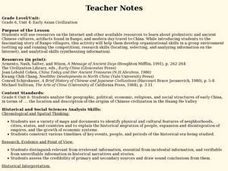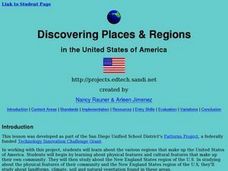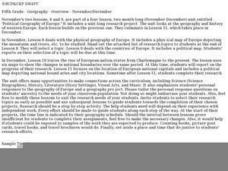Curated OER
Banpo Village: Gone, But Not Forgotten
Sixth graders plan a trip to China and prepare yourself for the Banpo excavation site competition by studying prehistoric and ancient Chinese history.
Curated OER
The Little Transistor That Could
Students research the history of the transistor to explore the nature of technology. They complete a worksheet that coincides with given websites. Then they write a one-page essay about their findings.
Curated OER
A River Runs Through Our Town
Students conduct an interview with a town resident, asking them to describe the history, use, and their memories of a river common to their community. They create a drawing of the river using information from the interview, and write...
Curated OER
Geography: African Floor Maps
Students explore the African continent and identify the various countries there. They examine the history, geography, environment, and inhabitants of the countries. Students create maps of Africa using a variety of materials.
Curated OER
GANDHI'S INDIA
Students describe key events in the life of Gandhi. They determine why knowledge of geography is necessary to understand the history of the people in a place or region. They write a summary of how the events in Gandhi's life,...
Curated OER
Maps and Models
Students study maps of New Mexico examining settlement patterns over time and the location of water sources. They research the history of their community and discover how cultural groups interacted, adapted to their physical...
Curated OER
Thematic Amusement Park Projects
Theme park lesson plans help students learn about history, science, and have fun at the same time.
Curated OER
Learning About Location: Charting the Path of the George W. Elder
Young scholars acquire a working knowledge of the geographical concepts: absolute location, relative location, longitude and latitude. They analyze primary sources that shows the physical and human characteristics of the places along...
Curated OER
1,000 Cranes
Young scholars improve motor skills through careful folding, a discipline necessary in the practice of origami. They develop multicultural awareness by exploring Japanese history.
Curated OER
From Rags to (Paper) Riches: Explore Colonial Papermaking
Young scholars explore Colonial papermaking. In this Colonial America U.S. history lesson, students analyze two poems written in the 1690s about the Rittenhouse paper mill to learn about papermaking. Young scholars produce...
Curated OER
Sustainability Project
Students explore alternative energy sources. In this environmental lesson, students discuss alternative energy sources and construct a plan to incorporate an alternative home technology into a bedroom. Students build a model of their...
Curated OER
Wappo Indians of Napa County
Third graders describe the American Indian nation in their local region long ago and in the recent past in terms of national identities, religious beliefs, customs, and various folklore traditions. They synthesize their findings into a...
Theodore Roosevelt Association
Roosevelt's Legacy: Conservation
The legacy of Theodore Roosevelt carries through modern American politics, economics, foreign policy, and society. But his proudest and most profound efforts were in the world of conservation, and in preserving the natural beauty of...
Curated OER
Mobile Phones
Investigate how mobile phones impact their lives through this technology lesson that has students discuss the history of the cell phone and research how cell phones are being used in third world countries. Students create a blog for new...
Curated OER
Discovering Places & Regions
Fifth graders research physical and cultural features of a place. They practice skills in gathering information from various sources, using tools such as graphic organizers, word processing, multimedia, and use of the Internet.
Curated OER
Grade 8 Unit 4
Eighth graders analyze aspirations and ideals of the people of the new nation, in terms of its physical landscapes and political divisions, and the territorial expansion of the United States during the terms of the first four presidents.
Curated OER
Political Geography of Europe
Fifth graders listen to a lecture that traces the political geography of Europe from 814 through 1997. They incorporate these themes into a research project on Western Europe.
Curated OER
Tornadoes
Students examine the characteristics of a tornado. They practice using new vocabulary and participate in a question and answer session. They use the internet to gather more specific information.
Curated OER
Going...going...gone? Tropical Rainforests-How They Work, What They Do for Us, What's Being Done to Them...
Sixth graders explore the Tropical Rainforest and come to understand what it is and how it affects the ecosystem. In this rainforests lesson, 6th graders write about the Tropical Rainforest, imagine they are in the Tropical Rainforest,...
Curated OER
A Common Thread
Sixth graders explore the Renaissance. In this Renaissance lesson, 6th graders study the culture and society of the middle ages. Students research the geography and climate of the times and discover how these affected agriculture.
Curated OER
It's Just a Barn
Investigate Pennsylvania Barns. Have your class consider the elements common to Pennsylvanian barns and why they are significant to the food production process. They write summaries of Frederick Watts and his impact on agriculture.
Curated OER
Neanderthals
Middle schoolers study Neanderthals. For this Prehistoric life lesson, students investigate two main theories regarding the relationship between Neanderthals and modern man. Middle schoolers will conduct research through several provided...
Curated OER
Basics of Archaeology
Students identify what and how to complete an Archaeological excavation is conducted. They identify the transition from one layer to the next more easily if the colors of the layers are different. When creating a dig, the teacher...
Curated OER
King Cotton
Fifth graders explore the cotton plant. In this cotton lesson, 5th graders research the process of growing cotton. Students explore the economic and cultural differences in the states that grew cotton for trade and industry.























